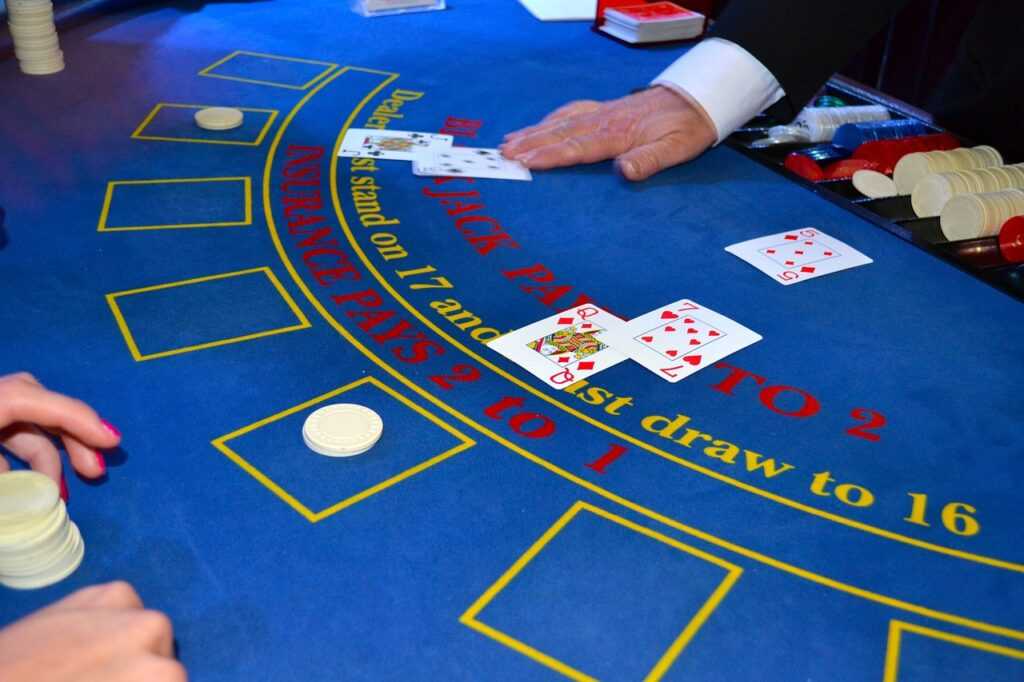The gambler’s fallacy is a common cognitive bias affecting people’s perception of probability and chance. It is the mistaken belief that past events influence future outcomes in independent random events. This fallacy often leads players to make irrational betting decisions based on patterns they believe exist.
This fallacy is particularly prevalent in games of chance like blackjack, where players might think they can predict the next hand based on previous outcomes. However, each hand of blackjack is an independent event, meaning previous hands have no bearing on the results of future hands.
How the Gambler’s Fallacy Affects Online Blackjack Players
Many online blackjack players fall into the trap of the gambler’s fallacy without even realising it.
A common mistake is believing that after a streak of losses, a win is “due” any moment. This thinking often leads to larger bets in hopes of a turnaround, only to result in even bigger losses when luck doesn’t change.
Another variation of this fallacy is assuming that if a strong hand, like a 20, has won multiple times in a row, it’s somehow more likely to lose in the next round. This can lead players to stray from optimal strategy, hurting their chances in the long run.
Some players also misinterpret card distributions, believing that if several low-value cards have appeared, high-value cards must be coming soon. While card counting can be useful in live blackjack, online games rely on random number generators (RNGs), making each hand independent of past results. In other words, no pattern or trend can predict what comes next.
Understanding and avoiding the gambler’s fallacy is key to making smarter betting decisions and improving your overall blackjack strategy.
The Role of Random Number Generators (RNGs) in Online Blackjack
Unlike physical blackjack tables, where card counting can provide an edge, online blackjack relies on RNGs to ensure fair play.
An RNG is a computer algorithm that generates random outcomes for each hand, making it impossible to predict future cards based on previous results. Every time a player starts a new hand in online blackjack, the deck is reshuffled, ensuring that each outcome remains independent.
Because of the role of RNGs, falling for the gambler’s fallacy in online blackjack can be especially damaging. Players who believe they can predict upcoming cards based on previous hands are operating under a false assumption. This can lead to poor decision-making, including reckless betting patterns and deviation from basic strategy, resulting in significant losses over time.
Suppose you want to enjoy online blackjack and other casino games in a secure and fair environment. In that case, you can Play at FanDuel Casino, where RNGs ensure that each hand is completely random and independent.
Examples of the Gambler’s Fallacy in Online Blackjack
To better understand how the gambler’s fallacy plays out in online blackjack, consider the following examples:
- Believing a Winning Streak Will End Soon. A player has won five hands in a row and starts betting conservatively, assuming a loss is inevitable. In reality, the chances of winning or losing the next hand remain the same, and reducing bet size unnecessarily could limit potential profits.
- Chasing Losses After a Losing Streak. A player loses five consecutive hands and doubles their bet on the next round, believing they are “due” for a win. This can lead to a rapid depletion of their bankroll if losses continue.
- Expecting Card Patterns to Form. A player notices multiple face cards have been dealt and assumes that lower-value cards are more likely to appear next. Each hand is independent in an RNG-based online blackjack game, making such predictions unreliable.
The Difference Between Gambler’s Fallacy and Card Counting
It’s easy to mix up the gambler’s fallacy with card counting, but they’re completely different things.
The gambler’s fallacy is based on a false belief that past outcomes affect future results. For example, thinking a low card is due just because several high cards have appeared is a classic gambler’s fallacy mistake.
Card counting, on the other hand, is a real strategy that skilled players use in live blackjack. It involves keeping track of high and low cards left in the deck to make smarter bets and decisions. But here’s the catch, it only works in games where the deck isn’t constantly shuffled. That’s why card counting is useless in most online blackjack games, where random number generators (RNGs) ensure each hand is independent.
If you try to “predict” cards in online blackjack based on previous hands, you’re not card counting, you’re falling for the gambler’s fallacy. Understanding the difference can help you avoid bad decisions and focus on strategies that actually work.
Final Words
The gambler’s fallacy is a common misconception that can lead online blackjack players to make irrational decisions based on perceived patterns in past results. Because online blackjack games use RNGs, each hand is independent, and past hands do not influence future outcomes. Players who fall for the gambler’s fallacy may increase their bets after losing streaks, assume winning streaks will end, or believe certain cards are due to appear.
To play online blackjack effectively, players should focus on sound strategy rather than flawed assumptions. Understanding probability, sticking to basic strategy, and managing one’s bankroll responsibly is key to avoiding the pitfalls of the gambler’s fallacy.
